A unique transformation is happening in healthcare. Unlike the past when external mandates drove technological shifts, Artificial Intelligence is unfolding naturally, spurred by innovation, competition, and efficiency. This demands a new kind of executive. Traditional leadership based on deep but narrow expertise is no longer effective. There’s no clear roadmap, which forces industry leaders to navigate this complex change in real-time. To thrive amidst new challenges, leaders must possess fresh skills and mindsets to keep up with advancing technology and rising expectations from providers and patients.
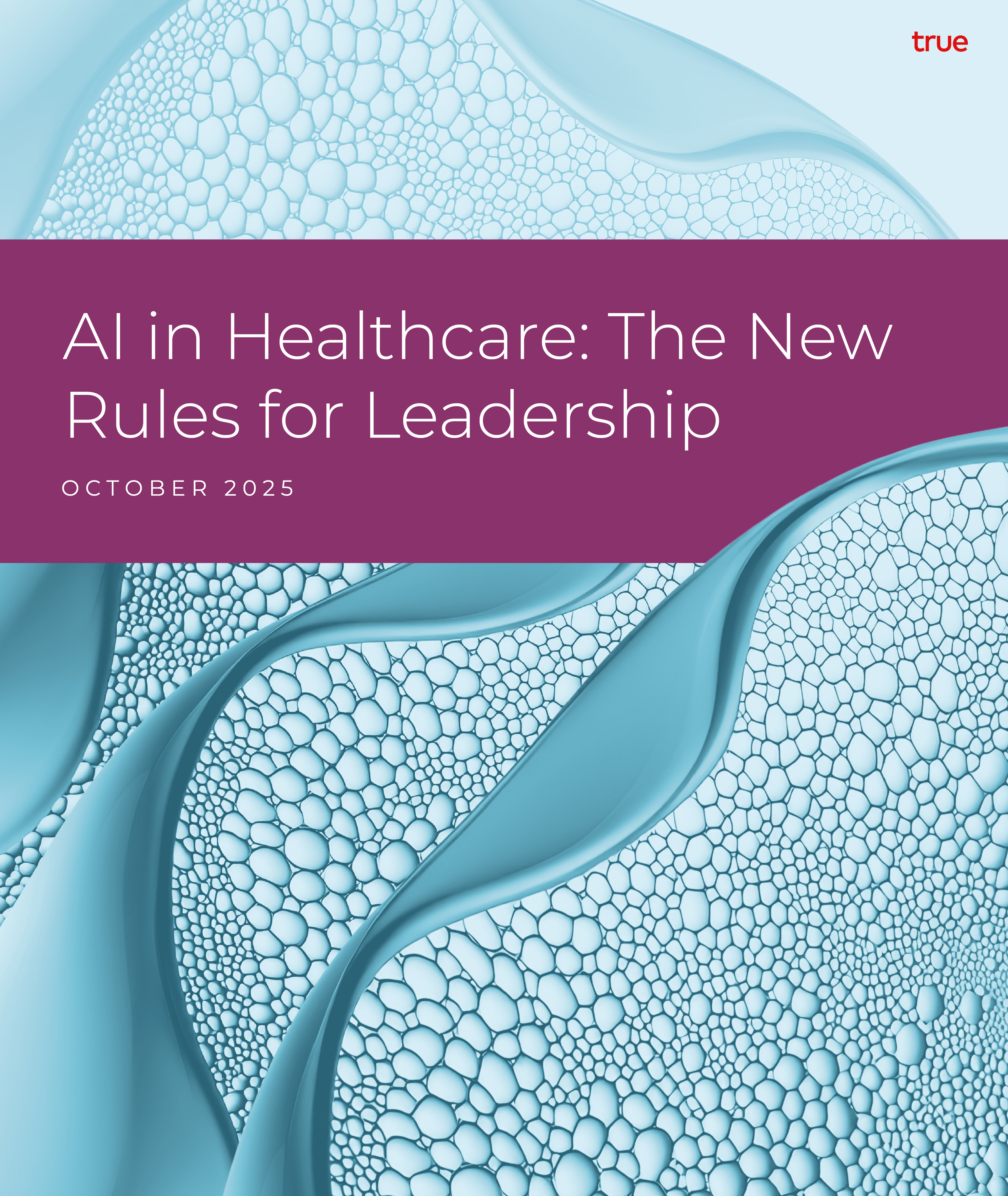
True’s Healthcare Practice leaders explore how AI is shifting today’s leadership profile and how to find transformative talent.
How AI is Changing Healthcare Talent
From remote patient monitoring to virtual health assistants, AI is transforming the very core of healthcare. Providers now integrate the tech into clinical decision support systems for complex data interpretation (e.g., radiology images, drug interactions, treatment options) and ambient listening tools that automate documentation, reducing clinician burnout. Two of healthcare’s most complex processes, Prior Authorization (PA) and Revenue Cycle Management (RCM) highlight the critical need for a talent refresh and new leadership skills.
AI in PA and RCM
Healthcare professionals know PA for heavy paperwork, treatment delays, and unclear reasons for claim denials. AI automates data submission for accuracy, cuts down on manual tasks, and speeds up decisions. But simply automating isn’t enough. Leaders must build systems that strike a careful balance between efficient technology and human medical expertise. For example, they can blend healthtech and human intelligence, where AI streamlines the process but medical professionals review claim denials to ensure technology supports, rather than replaces, patient care.
AI and machine learning are also overhauling RCM to streamline tasks, automate coding and billing, and accelerate revenue collection. It’s not just a software upgrade; it’s a complete “replatforming.” Leaders need more than financial experience here—they need to have led complex tech transformations.
A Shift in Skills in Demand
Healthcare leadership is changing in favor of an agile, digital transformer with strong interpersonal skills, as well as technical proficiency.
Product is at the cornerstone of all functions
Skills once limited to IT or product development are now essential for top healthcare executives, including the CEO. Our clients demand leaders with a basic grasp of product development, technology integration, and digital transformation. Among healthcare executives we’ve placed in the last four years, CEOs were most likely to have a product background (32%), followed by CMOs (26%). Today’s leadership candidates also need to demonstrate how they have used technology to drive efficiencies, and rebuilt processes from the ground up.
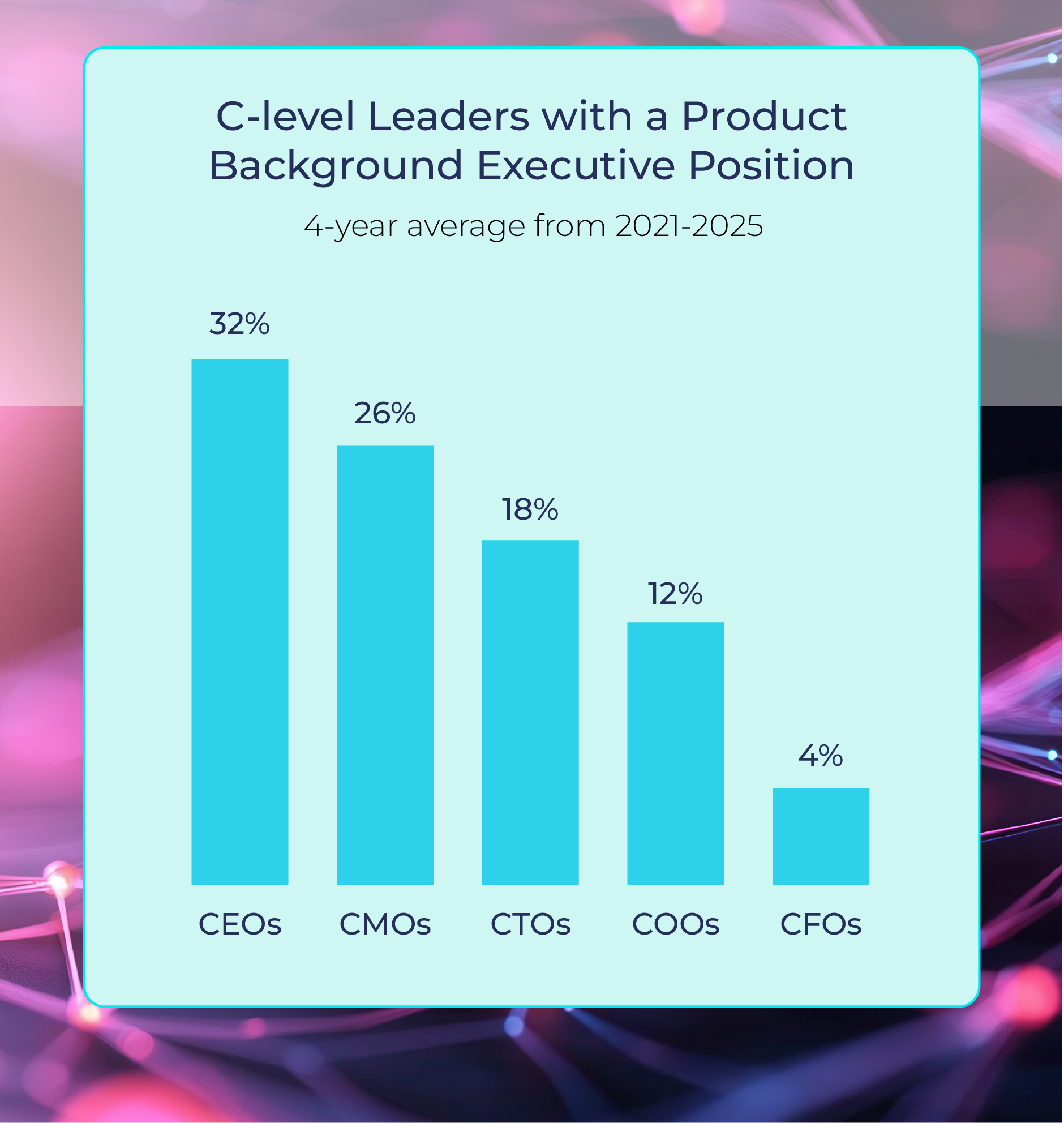
Intangibles are the new “power skills”
While technical expertise is essential, less tangible skills truly set apart executives ready for transformation. These are not traditional “soft skills” but mission-critical competencies for navigating an environment where there are no easy answers. Our clients repeatedly look for the following skills in new leadership candidates:
Growth mindset: A leader who is willing to admit the limits of their knowledge creates a learning organization, which helps foster an environment of innovation, experimentation, and adapting quickly, directly addressing the cultural resistance that has previously slowed healthcare’s technological advancement.
Intellectual curiosity: Leaders with an intrinsic drive to explore diverse fields beyond their core expertise, including AI, can effectively identify the most important questions to ask, enabling informed decision-making.
Adaptability and critical thinking: The absence of a clear roadmap requires the ability to identify core issues, pivot quickly when new information comes to light, and work toward novel solutions.
Operating in ambiguity: Leaders must be comfortable making decisions with incomplete information and be willing to take calculated risks, learn from failures quickly, and iterate toward a solution. They need to be entrepreneurial with a “fail fast” mentality.
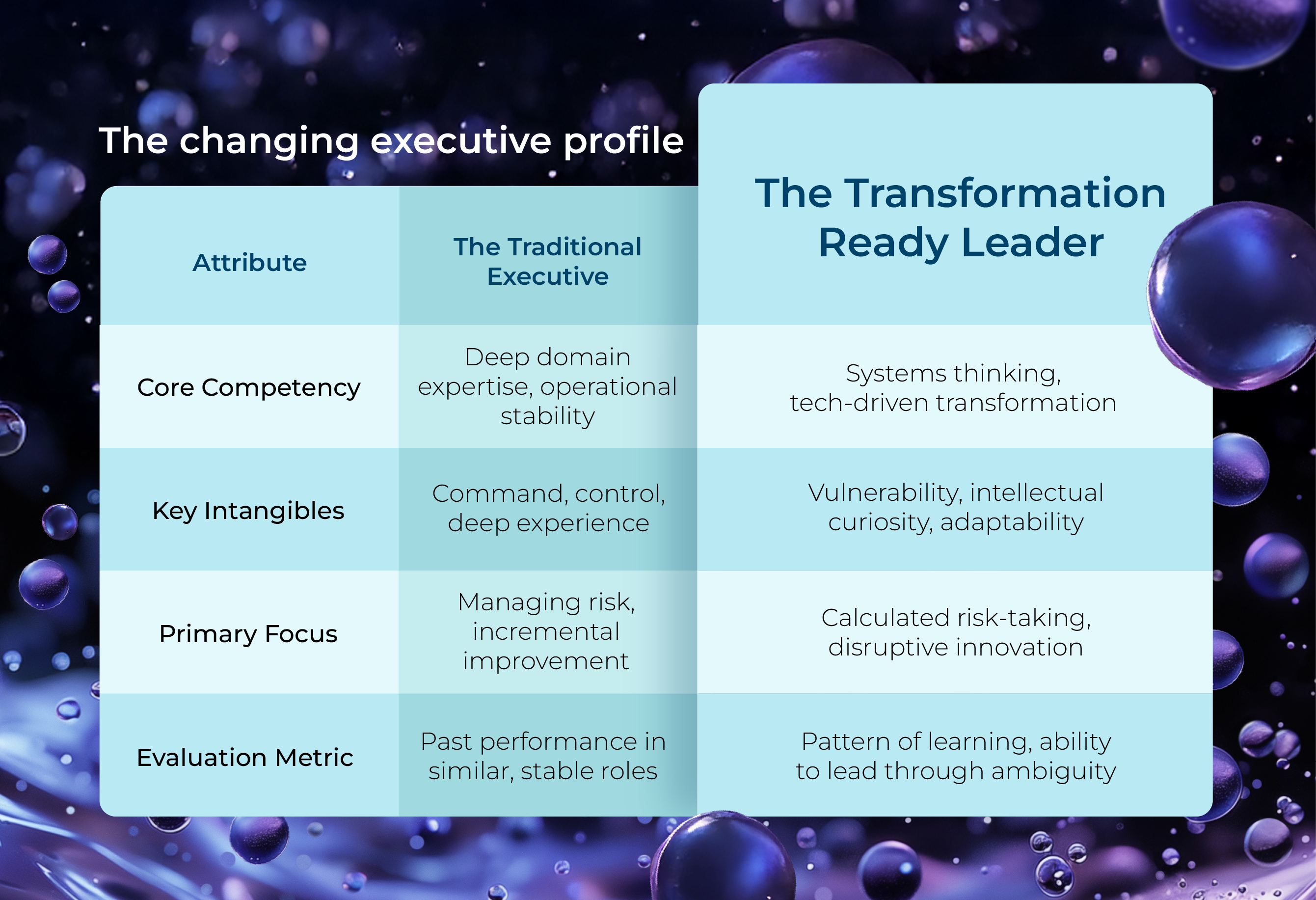
The Search for the AI Ready Leader
Organizations need to refresh previous hiring and talent management methods to create a workable strategy for finding, evaluating, and empowering these unique leaders.
The healthcare talent gap
Not many healthcare leaders have deep experience in tech transformation coupled with the advanced soft skills discussed earlier. This creates a significant talent gap. Fierce competition for a very small pool of qualified candidates is pushing organizations to rethink their talent strategy, shifting from traditional criteria to a more creative and forward-thinking model for talent assessment and building out their executive teams.
Where to Look for AI-Savvy Executives
The best approach isn’t to search for a “unicorn” leader. Instead, at True, we focus on building the ideal team for our clients. Think of it like Tetris: the goal isn’t to find one perfect piece that solves everything. It’s to find the right leader who fills the existing gaps in your executive team, forming a strong, highly effective whole.
This method shifts the focus from individual hires to building a complete team, and turns hiring into a strategic exercise: identify team gaps and fill them. For instance, a visionary CEO might need a COO with strong operational skills, or a seasoned operator with extensive healthcare experience might need a leader with a disruptive, tech-forward mindset.
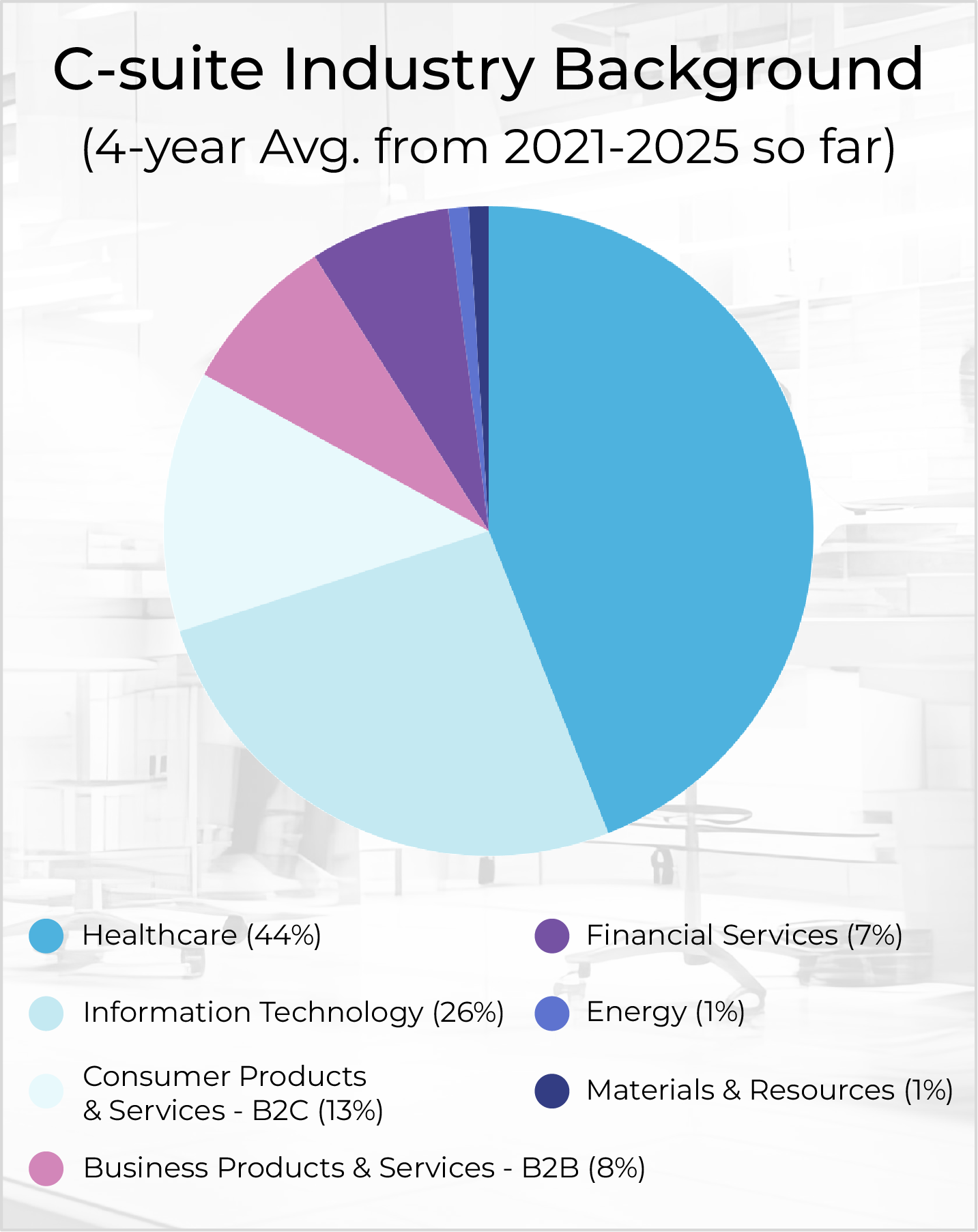
The most progressive of our clients have been open to unconventional candidates—including potential “rising stars” who may lack extensive C-suite experience, or executives new to healthcare—even if a candidate does not check every box on their list. In fact, 36% of new executives we placed in healthcare companies so far this year had no prior executive leadership experience, and 29% of all new placements had prior industry experience in information technology (IT).
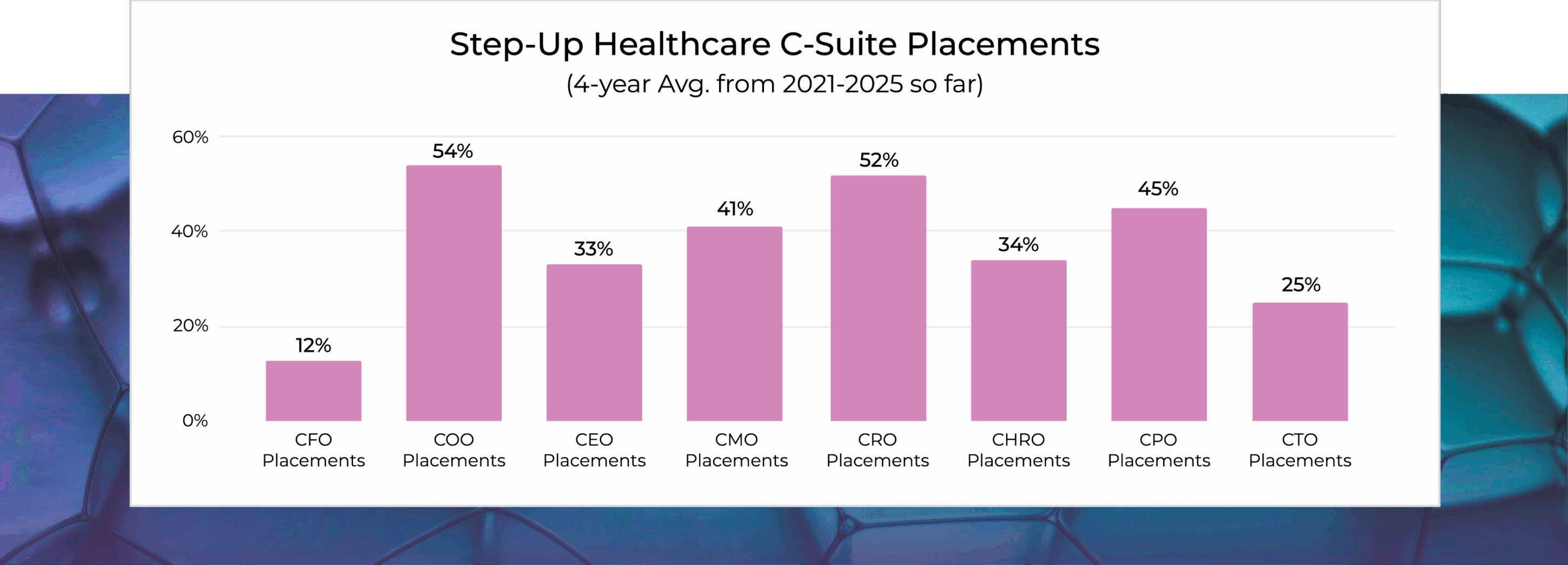
Rethinking Talent Search
The most effective organizations are rethinking their definition of relevant experience:
Expand the scope: Stop limiting searches to traditional healthcare backgrounds. The most relevant AI talent often comes from fintech, defense, logistics, and consumer technology. These sectors offer leaders with experience in large-scale systems, data-driven optimization, and sophisticated UX design, bringing fresh perspectives to healthcare.
Prioritize curiosity and action: Leaders who demonstrate active AI adoption in their current roles, whether through new tooling, process automation, or product innovation, is a strong indicator of the intellectual curiosity and drive required to succeed.
Rethink experience and seniority: Generative AI is a new frontier where organizations demand practical, hands-on experience as much as traditional credentials like PhDs. They prioritize candidates who are actively building and experimenting with AI—often junior or mid-level talent—as their fluency with modern AI tools, experience deploying models into production, and iterating based on real-world data is more valuable than purely theoretical knowledge.
Updating Assessments to Fit the AI Skillset
The key is to assess a leadership candidate’s potential to learn, adapt, and lead through ambiguity and new challenges—and how well they fit into the existing team—rather than just their past performance in stable environments.
Clarify the goal: Clarity on the specific AI need informs the ideal candidate profile. For example, does your organization need to build foundational AI from the ground up or are you looking to apply existing advancements to current business workflows? Do you need to build a new patient or provider-facing portal or reinvigorate an actively used platform?
Test for “responsible AI”: Given AI’s impact on human lives and strict healthcare regulations, candidates must show a strong grasp of responsible AI principles. Look for their understanding of bias, model transparency, and navigating regulations from bodies like the FDA or frameworks such as HIPAA. A lack of awareness in these areas is a major concern.
Assess for change leadership: The impact of AI extends beyond external, patient-facing products. The most effective leaders will also champion the adoption of AI internally to improve operations across functions. They must be capable of leading the change management required to roll out these new capabilities responsibly and effectively across the organization.
Advanced assessment methods, like Talent Advisory, True’s suite of tech and data-forward tools, help companies go beyond the basic, required skillsets to understand how to optimize their entire executive team and fill existing gaps.
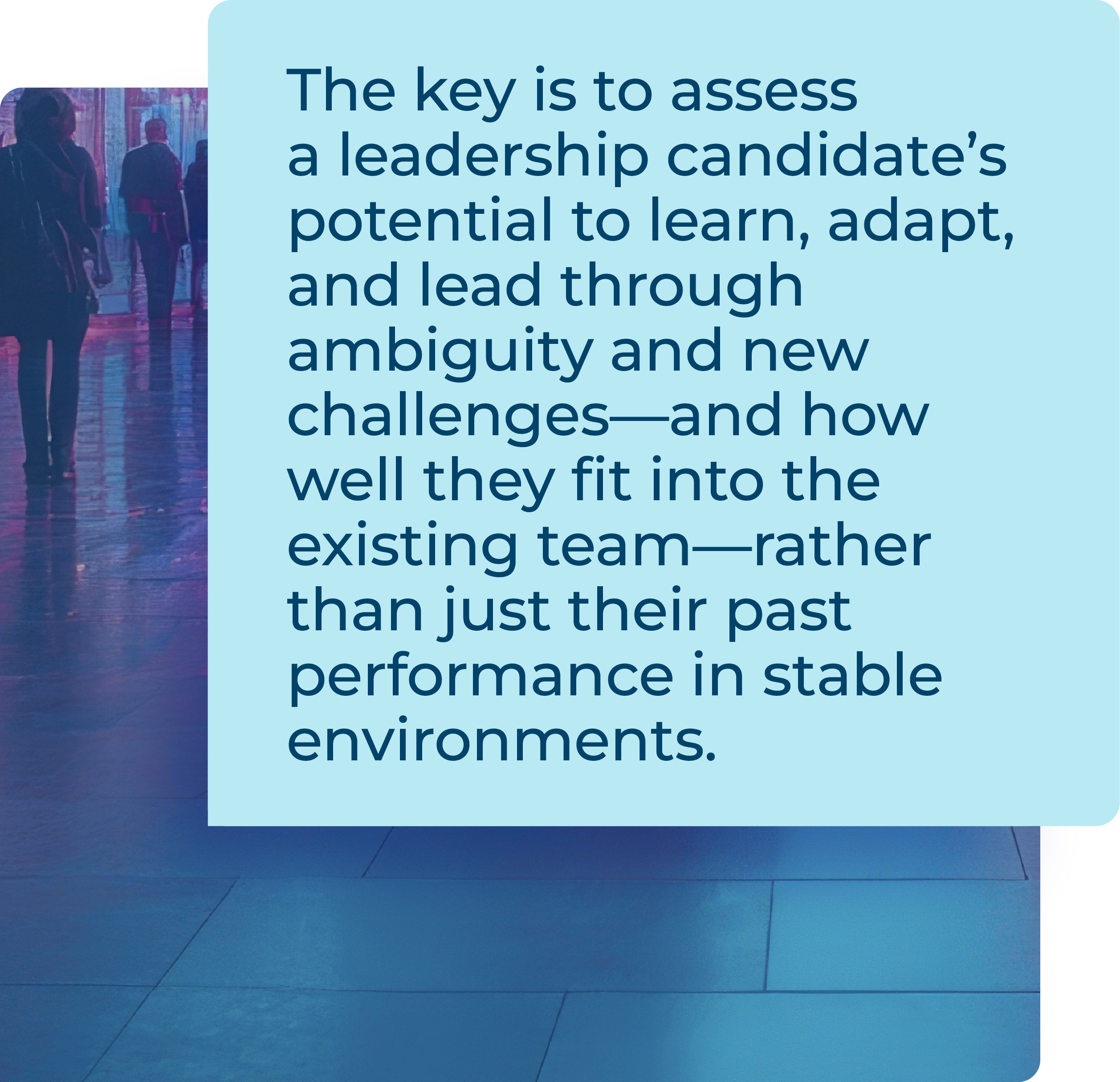
Seizing the Future of Healthcare
Transforming healthcare with AI is a complex, human-centric challenge. Success hinges on recognizing this human element, fostering new leadership, and leveraging AI’s potential to boost efficiency, improve decisions, and enhance patient care. The focus in talent acquisition is moving away from impressive resumes toward identifying individuals who can drive cultural change and introduce agile principles into a structured environment—qualities essential for an innovative culture. This shift explains why confidential searches are becoming more common, replacing leaders who resist change with those who can promote transformation, as companies prioritize cultural evolution over just technical proficiency.
AUTHORS

Jim O’Sullivan
Managing Director, Head of the Healthcare and Life Sciences Practices
.

Teresa Curtis
Partner, Head of the Healthcare Practice
.

Christina Stevens
Managing Director, Head of the Healthcare Practice
CONTRIBUTORS

Ariele Fleming
Managing Director,Head of the Product, Data & Technology Practice
.

Joseph Houlihan
Principal
For media inquiries, contact Jillian Ruggieri